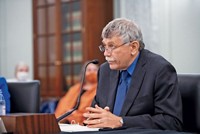Advertisement
Grab your lab coat. Let's get started
Welcome!
Welcome!
Create an account below to get 6 C&EN articles per month, receive newsletters and more - all free.
It seems this is your first time logging in online. Please enter the following information to continue.
As an ACS member you automatically get access to this site. All we need is few more details to create your reading experience.
Not you? Sign in with a different account.
Not you? Sign in with a different account.
ERROR 1
ERROR 1
ERROR 2
ERROR 2
ERROR 2
ERROR 2
ERROR 2
Password and Confirm password must match.
If you have an ACS member number, please enter it here so we can link this account to your membership. (optional)
ERROR 2
ACS values your privacy. By submitting your information, you are gaining access to C&EN and subscribing to our weekly newsletter. We use the information you provide to make your reading experience better, and we will never sell your data to third party members.
Policy
Legislators Rally Around Demoted Scientist
Federal employee pointed out problems with toxic FEMA trailers
by Cheryl Hogue
April 2, 2008
Key House lawmakers say a federal scientist who was reassigned after alerting his superiors about risks from formaldehyde in trailers supplied to Gulf Coast hurricane survivors is a whistle-blower in need of protection.
The scientist, Christopher De Rosa, also pushed for release of a withheld federal report on toxic substances in the Great Lakes.
De Rosa is the former director of the division of toxicology and environmental medicine at the Agency for Toxic Substances & Disease Registry (ATSDR). The 28-year federal employee was removed from his post in October 2007 and demoted to what one congressional aide describes as "the job track to nowhere."
In February, De Rosa was given a 90-day "personal improvement plan," which Rep. John D. Dingell (D-Mich.), chairman of the House Energy & Commerce Committee, describes as "a formal step toward termination." In recent weeks, Dingell and Rep. Bart Gordon (D-Tenn.), chairman of the House Science & Technology Committee, have sent letters to ATSDR Administrator Julie L. Gerberding, instructing her to protect De Rosa from retaliation.
On April 1, Gordon asked Gerberding to reinstate De Rosa to his old job and suspend the personal improvement plan.
Also on April 1, De Rosa described his experiences at a hearing of the House Science & Technology Subcommittee on Investigations & Oversight.
De Rosa said he raised concerns in February 2007 about a document analyzing the dangers of formaldehyde released by materials in the trailers supplied by the Federal Emergency Management Agency to victims of Hurricanes Katrina and Rita. De Rosa pointed out to his boss, Howard Frumkin, that the document did not address the risks from long-term exposure to formaldehyde, including cancer.
Frumkin, director of ATSDR's National Center for Environmental Health, told the subcommittee that ATSDR "should have moved more forcefully to address the emerging concern related to formaldehyde levels in FEMA-provided trailers." A revised version of the ATSDR document, released in October 2007, included warnings about chronic exposure to the chemical.
Meanwhile, De Rosa told his superiors in July 2007 that a decision by ATSDR managers to withhold a report on public health implications of toxic substances in the Great Lakes had "the appearance of censorship of science." After the Center for Public Integrity, an investigative journalism group, published leaked excerpts of the report earlier this year, ATSDR released the report in March.
Frumkin told the subcommittee that De Rosa was reassigned because of a "personnel matter," not retaliation for whistle-blowing. Frumpkin did not elaborate further, saying the matter was "best not discussed in public."
Congressional investigation into De Rosa's case continues. De Rosa has appealed his reassignment to the U.S. Merit Systems Protection Board.





Join the conversation
Contact the reporter
Submit a Letter to the Editor for publication
Engage with us on Twitter